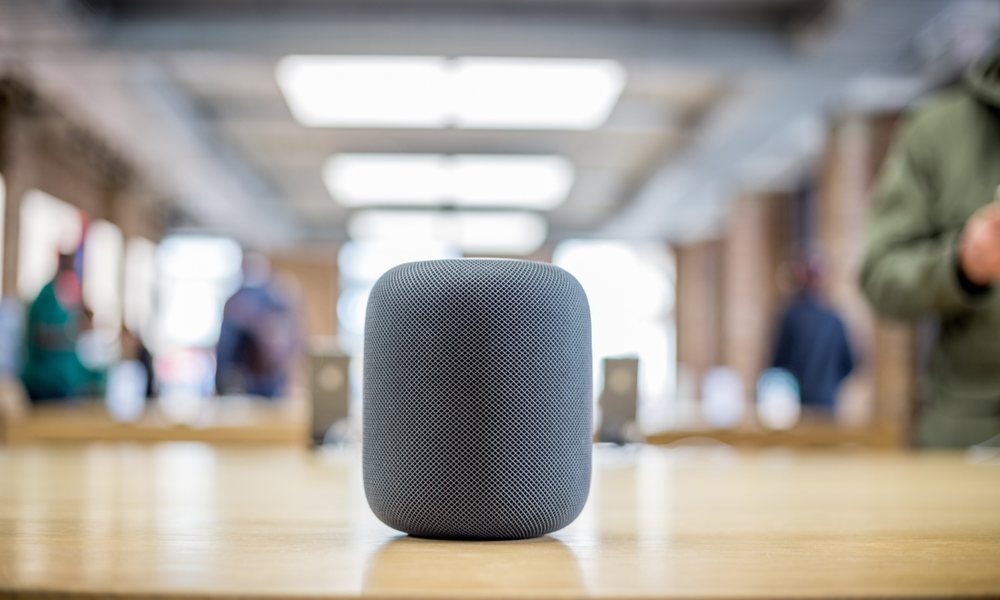What Does Apple’s HomePod Price Drop Say About the Speaker’s Future?
 Credit: Ksenija Toyechkina / Shutterstock
Credit: Ksenija Toyechkina / Shutterstock
Toggle Dark Mode
In a somewhat rare move for a current Apple product, the company has slashed the selling price of its HomePod smart speaker by around 15 percent, bringing its U.S. price down from $349 to $299. While it wasn’t uncommon to find sales on Apple’s speaker at various retailers, especially during the holiday season, this latest change drops it to the sub-$300 level, and since Apple, apart from Black Friday events, doesn’t normally put items on sale, it’s fair to say that this is a permanent price drop.
The price drop also appears to be a worldwide phenomenon, with similar reductions in Apple’s online store in other countries; in Canada, the HomePod is now $399 versus $449, and in the U.K. the price has dropped from £319 to £279.
While reports indicate that HomePod sales grew over the holiday quarter, Apple still actually lost market share to rivals such as Amazon and Google, both of which significantly outpaced Apple’s growth, likely helped largely by the lower-priced entry-level versions of their smart speakers. Numerous promotions and discounts have also been available at other retailers, which likely contributed to the speaker’s increased sales.
With Amazon’s Echo and Google’s Home speakers starting at under $100, it’s easy to see why they enjoy a combined 65 percent market share against the paltry six percent that’s held by the HomePod. In fact, even Amazon’s most expensive Echo speaker comes in at less than half the price of Apple’s. Add to that the wide range of third-party speakers that incorporate Amazon’s Alexa voice assistant, and it’s clear that HomePod and Siri are fighting a losing battle right now.
Only Apple knows for certain how much of the holiday quarter sales bump came from discounted HomePods, it’s a safe bet that this definitely helped the sales of the smart speaker, and Apple now realizes that it needs to make a permanent pricing change amidst likely flagging sales in the post-holiday season.
Notably, a recent report suggested that Apple is already losing money on the HomePod, with sources giving well-known Apple analyst John Gruber “reason to believe” that Apple sells the speaker at a loss. If this is true — or even if Apple is selling the HomePod at a break-even point — the sudden price reductions mean that Apple will ultimately be losing even more money on the smart speaker. HomePod does serve as a gateway into Apple’s services ecosystem — particularly Apple Music — which may allow Apple to make up the difference on enticing users into monthly subscriptions, but with Apple also now offering Apple Music on competing devices, it’s a tougher sell; users who buy a HomePod may have little choice but to subscribe to Apple Music, but users can also now get the Apple Music experience elsewhere.
However, Apple is almost certainly thinking strategically in its smart speaker partnerships. The company undoubtedly realizes that it can’t compete with speakers at the Amazon Echo price level — and probably doesn’t want to be in that market any more than it does for low-cost phones and laptops — so a partnership with Amazon is generally going to be a win for Apple Music without any serious risk to HomePod sales. However, despite rumours that native Apple Music support could also come to Google Home speakers, Apple may be much more reluctant to bring the service to speakers that also compete at HomePod’s price level. Hence, Apple Music subscribers who are serious about sound quality are still left with the HomePod as their only practical choice.
Of course, the price reduction could also be an attempt to move out old stock prior to announcing a new second-generation HomePod, although there has been little buzz suggesting that such a release is imminent, and Apple traditionally doesn’t drop prices before a new product release, choosing instead to simply release new products at the same price as prior models. For example, Apple’s 2016 AirPods continued to be sold for $159 until the very day that the company released its second-generation AirPods last month, although it’s also fair to say that Apple’s wireless earbuds are at the opposite end of the spectrum when it comes to popularity and sales volume.
There have also been rumours over the past year that Apple is planning to launch a more affordable HomePod this year, although analysts suggest that this may not have a significant impact on sales in the longer term. The lower-cost model could take the form of a “HomePod Mini” — a physically smaller version — or could simply cut corners on some of the HomePod’s much-vaunted acoustic modelling features, sacrificing premium sound quality in much the same way that most competing smart speakers have.
Either way, the price reduction of HomePod feels like a slightly desperate move to boost up the flagging sales of Apple’s smart speaker. While Apple could typically care less about market share, the company and its shareholders definitely care about profitability, and if the HomePod is already being sold at a loss, this doesn’t bode well for the product’s future unless Apple is able to use it to seriously drive services revenue or iPhone . Otherwise we fear that Apple’s HomePod may go the way of the iPod Hi-Fi — another great speaker that we loved that sadly just didn’t seem to fit into the market.






